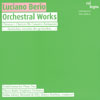Berio Orchestral Works
Do repeated reworkings render a composer’s music meaningless?
View record and artist detailsRecord and Artist Details
Composer or Director: Luciano Berio
Genre:
Orchestral
Label: Col legno
Magazine Review Date: 7/2009
Media Format: CD or Download
Media Runtime: 0
Mastering:
Stereo
DDD
Catalogue Number: WWE1CD20281

Tracks:
| Composition | Artist Credit |
|---|---|
| Chemins I |
Luciano Berio, Composer
Anne Verkholantseva, Harp Luciano Berio, Composer Martyn Brabbins, Conductor Vienna Radio Symphony Orchestra |
| Chemins IIb |
Luciano Berio, Composer
Luciano Berio, Composer Martyn Brabbins, Conductor Vienna Radio Symphony Orchestra |
| Concerto for two Pianos and Orchestra |
Luciano Berio, Composer
Bertrand de Billy, Conductor GrauSchuhmacher Piano Duo Luciano Berio, Composer Vienna Radio Symphony Orchestra |
| Formazioni |
Luciano Berio, Composer
Luciano Berio, Composer Stefan Asbury, Conductor Vienna Radio Symphony Orchestra |
Author: Philip_Clark
Chemins IIb (1970) for orchestra has a more complex etymology. Originally Sequenza VI for solo viola, Berio initially adapted it for viola and nine instruments: Chemins II was what he called an orchestral remake; Chemins IIb is essentially the same music minus the viola. But has Berio ploughed his material into the ground through overuse? Certainly orchestral surges sound like they ought to be impressive but a monochrome chromatic blandness robs the music of impetus or direction. Similar problems haunt Formazioni (1986) for orchestra – Berio’s harmonies are indistinct and his gestures are stuffed with hollow rhetoric.
The two-piano concerto, in contrast, has clarity and psychological edge. If the performances of the Chemins and Formazioni feel listless, that might be because the musicians are aiming to place difficult right notes inside an expressive void. In the concerto, Berio’s clustery, grandstanding piano-writing bounces against his orchestral vistas and suddenly his gestures feel open-ended and generous. But by itself, that’s no recommendation – especially as, in place of booklet-notes, there’s terrible poetry by Ferdinand Schmatz for you to read.
Discover the world's largest classical music catalogue with Presto Music.

Gramophone Digital Club
- Digital Edition
- Digital Archive
- Reviews Database
- Full website access
From £8.75 / month
Subscribe
Gramophone Full Club
- Print Edition
- Digital Edition
- Digital Archive
- Reviews Database
- Full website access
From £11.00 / month
Subscribe
If you are a library, university or other organisation that would be interested in an institutional subscription to Gramophone please click here for further information.




